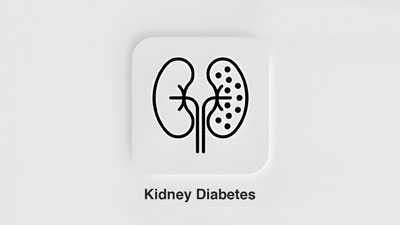Diabetes is a persistent condition characterized by the body's inability to regulate blood sugar levels and is a significant global health problem. Data show that a significant portion of the population is affected by the disease, and the incidence of diabetes is increasing, especially among young people and adolescents. But did you know that diabetes is a major risk factor for kidney disease? High blood sugar levels can damage blood vessels in the kidneys, leading to kidney damage and ultimately kidney failure.we talked Dr. Mukesh Batra, Founder and Chairman of Dr. Batra's Healthcare, Padmashree Awardeeexplained the relationship between diabetes and kidney disease.
India's diabetic population reached 77 million in 2019 and is expected to rise to more than 134 million by 2045, according to findings reported in the Indian Journal of Optharmology. Alarmingly, 57% of these cases are undiagnosed. It is estimated that by 2035, diabetes will claim approximately 592 million lives worldwide.
Relationship between diabetes and kidney disease
According to the National Kidney Foundation, kidney failure ultimately affects 10 to 40 percent of people with type 2 diabetes (adult onset) and about 30 percent of children with type 1 diabetes (young onset). Dr. Batra points out the link between diabetes and kidney disease:
- The blood vessels in the kidneys, which are responsible for filtration, are made up of small blood vessels.
- Prolonged high blood sugar levels can narrow and block these blood vessels. As a result, the insufficient blood supply damages the kidneys and allows albumin, a type of protein, to pass through the filter and be excreted in the urine where it shouldn't be.
- Diabetes can also damage nerves throughout the body, including those involved in bladder function.
“Nerves facilitate communication between the brain and different parts of the body and send signals when the bladder is full. However, nerve damage caused by diabetes disrupts this signaling, resulting in As a result, pressure from an overly full bladder can cause damage to the “kidneys,'' Dr. Batra added.
Additionally, bladder dysfunction that causes urine to remain in the bladder for long periods of time can increase the risk of urinary tract infections. Elevated sugar levels in the urine create a favorable environment for the growth of bacteria, leading to infections that mainly affect the bladder, but in some cases can spread to the kidneys.
Homeopathic treatment for diabetes management
Combining homeopathic medicine with hypoglycemic drugs and insulin provides a holistic approach to managing diabetes. Dr. Batra says, “Administering homeopathic remedies alongside conventional treatments can help stabilize insulin levels and may lead to gradual tapering and eventual discontinuation of conventional anti-diabetic drugs.” “There is,” he said.
Dr. Batra highlighted a recent study conducted in Athens that showed promising results due to the synergistic effects of homeopathic treatments. In this study, he divided a group of type 2 diabetic patients into two groups. One was given a standard oral anti-diabetic drug plus a placebo, and the other was given the same drug plus homeopathy.
He added: “Over nine months, group 2, who received both conventional medication and homeopathic treatment, showed a significant improvement in diabetes control of 97%, compared to group 1, who showed a 47% improvement. '' he added.
“Homeopathic remedies such as homeopathic insulin help maintain healthy blood sugar levels and prevent sugar in the urine. Abroma augusta is known as an effective natural homeopathic remedy for diabetes. is helpful in treating vision loss,” Dr. Batra added.
Lifestyle tips to follow
Here are some lifestyle habits that experts recommend you should adopt to maintain balanced diabetes levels.
- Avoid processed and unhealthy foods that are loaded with sugar.
- Choose whole foods rich in fiber, such as oats, fruits, vegetables (such as bitter melon), and seeds with a low glycemic index.
- To support weight management, incorporate consistent physical activity into your daily routine, such as a daily 30-minute walk.
- Quit smoking completely or minimize your alcohol intake.
[Disclaimer: This article contains information provided by an expert and is for informational purposes only. Hence, we advise you to consult your expert if you are dealing with any health issues to get the necessary treatment.]


